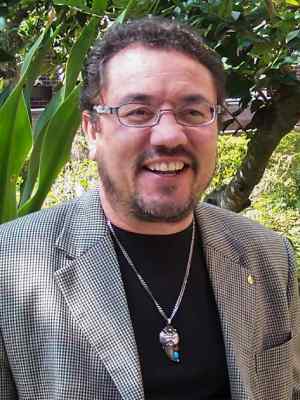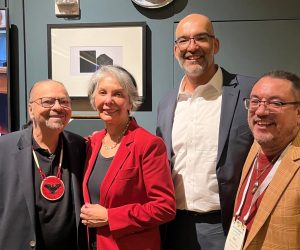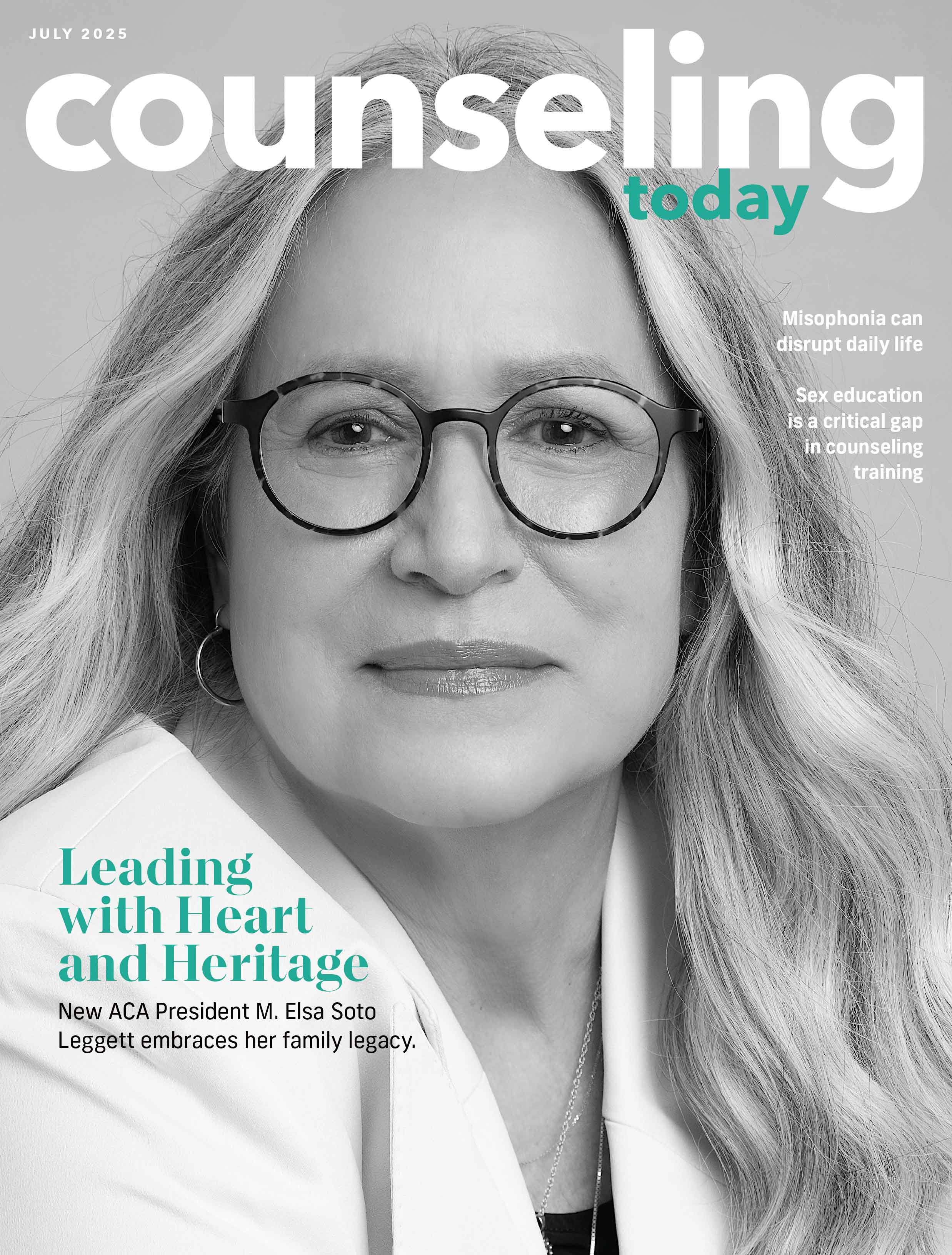Edil Torres Rivera: Ready for action
July 2023

As the American Counseling Association’s 72nd president, Edil Torres Rivera wants to keep the counseling community strong, elevate the profession, and continue growing and improving alongside the members of ACA and its divisions. He invites all members to move beyond the status quo.
Torres Rivera, a professor of counseling and Latinx cluster coordinator at Wichita State University who specializes in multicultural counseling, group work, chaos theory and liberation psychology, is ready to take on the presidency with the same unstoppable passion and determination that have propelled him to succeed at both the personal and professional levels. “I will hit the ground running to put things in motion,” he says.
ACA’s new president credits his mother, Iris Rivera, with his drive and determination. She has been one of the most powerful influences in his life. Raising three children as a single mother in Puerto Rico, Rivera went to school at night because she wanted to learn how to read and write. Education has always been her primary goal, and according to Torres Rivera, she never gave him much of a choice other than to do well in school.
Another important influence in his life was Torres Rivera’s mentor, the late Michael Wilbur, who was a professor of counseling psychology at the University of Connecticut when Torres Rivera was a doctoral student there. “Michael was the one who saw something in me, who recruited me into the Ph.D. program and taught me how to get published,” Torres Rivera recalls.
Through his unwavering commitment to the profession, Torres Rivera has also earned the respect and admiration of his colleagues. He is known for his genuine kindness and concern for others, which he demonstrates in his daily interactions. Torres Rivera is highly sought after as a mentor, and his guidance has helped shape many counselors’ careers.
“Edil is a great mentor because he really cares about students and he makes himself accessible and available with them,” says Patricia Arredondo, a past president of ACA (2005-2006) and the president of the Arredondo Advisory Group. Arredondo met Torres Rivera in 1996 at the Association for Multicultural Counseling and Development (AMCD) Conference in Orlando, when she was the AMCD president. “We have a lot of knowledge of one another,” she says. Arredondo, who was named a “Living Legend” by ACA for her extensive contributions to multicultural counseling, was the first ACA Latinx president. Torres Rivera will be the second one.
Authentic leader and mentor
Carlos Hipolito-Delgado, a professor of counseling at the University of Colorado Denver, regards Torres Rivera as an exceptional mentor, close friend and confidant. Hipolito-Delgado admits that while he has had other mentors and senior faculty throughout his career, most of them were usually the ones in the spotlight and could not be easily questioned. “In contrast, Edil has always been very approachable and receptive with me,” says Hipolito-Delgado, a past president for AMCD. He adds that Torres Rivera always takes the lead in guiding him and cautioning him about potential consequences.
Manuel Zamarripa, co-director and co-founder of the Institute of Chicana/o/x Psychology in Austin, Texas, met Torres Rivera in the early 2000s at The Winter Roundtable, an annual conference hosted by Teachers College at Columbia University in New York City.
“Edil is truly authentic. He always says what he thinks,” Zamarripa says. The moment they met, they discovered a profound connection rooted in their shared interest in Latinx psychology. Torres Rivera, who is Puerto Rican, and Zamarripa, who is Chicano, were immediately drawn to each other’s commonalities and differences. That initial meeting marked the beginning of a meaningful friendship.
Zamarripa, a dean of counseling at Austin Community College District, admires Torres Rivera not only for his wonderful sense of humor but also for his sharp critical mind. “In a profession that demands serious attention to complex issues, finding someone like Torres Rivera with this unique blend of wit and wisdom is no easy feat,” Zamarripa says.
Arredondo, an ACA Fellow and a founding member of Counselors for Social Justice, also highlights Torres Rivera’s excellent sense of humor, with the ability to laugh at himself. “He also has a talent for storytelling, which makes him an entertaining and enjoyable person to be around,” she adds.
Arredondo says she has high expectations of Torres Rivera as the ACA president because he is a hardworking, energetic and inclusive person who looks for equity in everything. “Edil se mete [gets involved],” she says. “He doesn’t expect other people to do what he has to do. He is very responsive. If you ask something or you inquire about something, he will immediately get back to you.”
A strong supporter of women
 In keeping with Latin American tradition, Torres Rivera wants to be addressed by both of his last names. In many countries throughout the region, individuals are identified by both their father’s last name (Torres, in this case) and their mother’s last name (Rivera). Torres Rivera uses both last names to honor his mother, to acknowledge the important role women have played in his life and to preserve this cultural custom.
In keeping with Latin American tradition, Torres Rivera wants to be addressed by both of his last names. In many countries throughout the region, individuals are identified by both their father’s last name (Torres, in this case) and their mother’s last name (Rivera). Torres Rivera uses both last names to honor his mother, to acknowledge the important role women have played in his life and to preserve this cultural custom.
“Edil is very family-oriented, respectful and a strong supporter of women, including all the women in his family,” Arredondo says.
Torres Rivera’s grandmother, Paubla, was a spiritual healer, or espiritista. He was supposed to follow in her footsteps, but he didn’t want to. However, when Torres Rivera joined the U.S. Army and was transferred from Virginia to Germany, he discovered that Boston University was the only institution offering master’s degrees in its overseas program — one in school counseling and one in mental health counseling. With these limited choices, Torres Rivera decided to pursue a master’s in mental health counseling.
 “The time in the Army also helped me learn to improvise, adapt to changes and expect the unexpected,” he adds.
“The time in the Army also helped me learn to improvise, adapt to changes and expect the unexpected,” he adds.

Torres Rivera shares the same passion for mental health with his wife, Ivelisse Torres Fernandez, a school psychologist who is also from Puerto Rico. Torres Rivera is also the proud father of Taina D. Torres and grandfather of Eliza Cielo Torres Gerber. His daughter, who lives in New Jersey, inherited the same zeal for teaching as her father. She is a successful educator and was recently hired as an educational consultant in Transcend, a national nonprofit organization. In this role, Taina Torres supports educational leaders in their work to reimagine and design schools to provide extraordinary experiences to students.
Proud of his heritage
Torres Rivera has always been proud of his Puerto Rican heritage. One of his main childhood heroes was Pedro Albizu Campos, a Puerto Rican nationalist who many considered to be the “father of the country” because of his involvement with Puerto Rico’s independence movement. Torres Rivera strongly admired Albizu Campos because he never stopped fighting for Puerto Rico’s independence.
Since childhood, Torres Rivera has practiced boxing, a hobby that stems from Puerto Rico’s rich history with the sport. Torres Rivera says boxing is an art, and he enjoys watching it because he likes observing the diverse range of techniques. He also finds some parallels between boxing and life: “Life is not nice,” he says. “Life is cruel; we are always in some kind of battle.”
He describes boxing as a good depiction of how we continuously fight to stay alive. “When you finish a battle, you have to start preparing for the next one,” he explains. “You may have some minutes of rest between rounds, but just like life, boxing is an ongoing process that never stops.”
Plans for ACA
Torres Rivera says his educational approach aligns with that of Paulo Freire, a Brazilian educator and philosopher who thought the best learning happens in the interaction between the professor and the student. Those interactions are what Torres Rivera enjoys most. “It is not necessarily the content, but what happens in between the content and the student-professor interaction,” he says.
Like Freire, he also believes that professors have to be able to make their students uncomfortable. “If students are comfortable, they do not need to change, and then they are not learning,” he explains.
Arredondo notes that Torres Rivera’s academic background is a benefit in his new role as ACA president. Being both a scholar — who has published two books (with two more in press) and more than 90 articles and book chapters — and a practitioner can uplift the association, she says.
“Edil is a person who has been around the block,” she adds. “He is not a person who will necessarily accept everything as it is. He is the kind of leader who will always question how they can do things better, and that is good.”
 Bernal Baca, Patricia Arredondo, Carlos Hipolito-Delgado and Edil Torres Rivera..
Bernal Baca, Patricia Arredondo, Carlos Hipolito-Delgado and Edil Torres Rivera..
Hipolito-Delgado says Torres Rivera will have a responsive approach as ACA president and will focus on members and their needs as ACA restructures its leadership to become more streamlined and efficient.
Torres Rivera says he wants ACA to be a “we” association that always considers those who have been “othered” by society and comes together for the well-being of humankind. Arredondo notes that Torres Rivera shares her passion for social justice, equity and consideration of how people who are often excluded from counseling need to be included. Even though she thinks it may take some years to come to fruition, they would both like more bilingual counseling and Spanish programs at ACA conferences. This would allow Spanish-speaking counselors to be authentic and bring their own voice to their presentations.
As president, Torres Rivera plans to work with ACA members and staff on several initiatives, including developing a research agenda to facilitate the process of decolonization and anti-racism; creating a rapid response protocol for addressing issues that have an impact on counseling, mental health and individual wellness; continuing the focus on improving governance by ushering through necessary change; and creating a new, more realistic strategic plan that involves key stakeholders.
Torres Rivera says ACA is his home, his comfort zone and, more than anything else, a place where he can be real. He is proud of ACA for many reasons, especially because it was the first formal organization to endorse multicultural counseling competencies. “It’s no surprise that ACA members have stepped up to provide and advocate for ethical and appropriate care for the clients that need us most,” he says.
Even though he admits the road ahead will have its challenges, he is excited to lead ACA and find more opportunities of synergy and balance for the counseling profession and for this organization he holds so dear.
Torres Rivera asks counselors to use their skills “to rediscover existing knowledge, appreciate the lessons of their ancestors, reflect, and raise critical consciousness to facilitate understanding and change.”
Gabriela Escarrá is a freelance writer and certified translator who specializes in marketing, corporate communication and the International Organization for Standardization standards.
Opinions expressed and statements made in articles appearing in Counseling Today do not necessarily represent the opinions of the editors or policies of the American Counseling Association.


